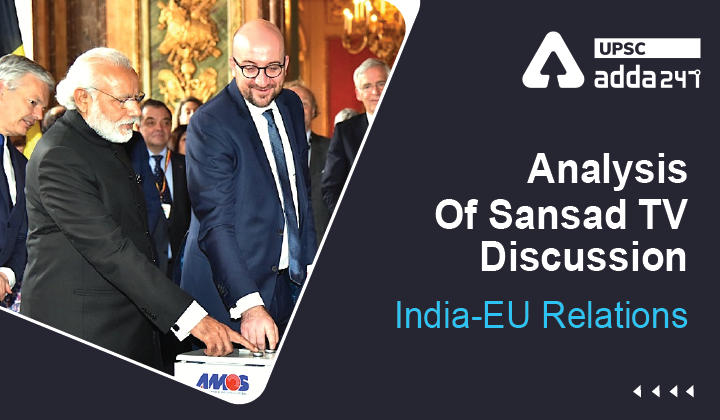Table of Contents
Analysis Of Sansad TV Discussion
”India-EU Relations”
Relevance
GS 2: Groupings & Agreements Involving India and/or Affecting India’s Interests, Global Groupings, Effect of Policies & Politics of Countries on India’s Interests
Context
- President of the European Commission Ursula Von Der Leyen is on a two–day official visit to India where both sides reviewed the progress on various aspects of the relationship and further intensify the multifaceted partnership with EU.
- PM inaugurated the seventh edition of the Raisina Dialogue. The dialogue, which will be held over three days from April 25 to April 27, will witness the participation of European Commission President Ursula Von Der Leyen as the chief guest.
Background
- India and the European Union share a vibrant Strategic Partnership which has been witnessing strong growth with wider and deeper cooperation in Political and Strategic, Trade and Commerce, Climate and Sustainability, Digital and Technology aspects as well as people-to-people ties.
- The India-EU Leaders’ Meeting held in May last year set new milestones with the decision to resume trade talks and the launch of the India-EU Connectivity Partnership.
Key Takeaways
- President von der Leyen and Prime Minister Narendra Modi agreed to establish a joint Trade and Technology Council to tackle key trade, economic and technology challenges, and advance cooperation in these areas.
- They also agreed to resume negotiations for an EU-India Free Trade Agreement and to start talks on an Investment Protection Agreement as well as on an Agreement on Geographical Indications. The first round of negotiations will take place in June.
Trade Relations between India & EU
- India is a key strategic partner for the European Union.
- The EU is India’s third-largest trading partner and second largest export destination.
- It is also one of the largest investors in India, and there remains a lot of untapped potential.
India-EU Relations & Climate Change
- The EU’s Global Gateway strategy opens new opportunities for cooperation and investments in secure and sustainable infrastructure in India and in the region.
- Given their size, economic performance and energy needs, India and the European Union are key in the transition to a more sustainable and green future
- The solar energy will play a decisive role to reach our objectives on the way to net zero, both in India and in Europe.
What is Raisina Dialogue?
- The Raisina Dialogue is India’s premier foreign policy conference.
- This is Organized along the lines of the Shangri-La Dialogue held in Singapore, and co-hosted by the ministry of external affairs (MEA) and the Observer Research Foundation, it takes its name from the Raisina Hills, where India’s seat of power resides.
- The Dialogue, since its inception, has attracted academics, scholars, researchers, students, journalists and even politicians who are either interested—or are working—in the field of international relations, geopolitics, security, nuclear issues and Indian foreign policy.
The theme of this year’s Raisina Dialogue
Over the course of three days, the dialogue will feature panel discussions across multiple formats on six thematic pillars. These are:
1. Rethinking democracy: Trade, Tech and Ideology
2. End of Multilateralism: A Networked Global Order?
3. Water Caucuses: Turbulent Tides in the Indo-Pacific
4. Communities Inc: First Responders to Health, Development, and Planet
5. Achieving Green Transitions: Common Imperative, Diverging Realities
6. Samson vs Goliath: The Persistent and Relentless Tech Wars
Conclusion
EU is India’s largest trading partner in goods and also one of the most important sources of Foreign Direct Investment. An India-EU Free Trade Agreement would unlock the full potential of India-EU economic relations. As free-market economies, and world’s largest democracies, it is important for like-minded countries like India and the EU to deepen its economic engagement.



 TSPSC Group 1 Question Paper 2024, Downl...
TSPSC Group 1 Question Paper 2024, Downl...
 TSPSC Group 1 Answer key 2024 Out, Downl...
TSPSC Group 1 Answer key 2024 Out, Downl...
 UPSC Prelims 2024 Question Paper, Downlo...
UPSC Prelims 2024 Question Paper, Downlo...




